Leadership and Management Report: UPS Case Study Analysis
VerifiedAdded on 2020/06/05
|15
|3639
|36
Report
AI Summary
This report delves into the critical aspects of leadership and management, focusing on the recruitment and selection process, the skills required for effective leadership, and the differences between leadership and management. It explores various leadership styles, including authoritative, participative, and free rein approaches, and discusses strategies for motivating staff to achieve organizational objectives. The report also highlights the benefits of teamwork. The analysis is supported by a case study of UPS, examining the impact of leadership and management practices on organizational success. The report provides insights into legal, regulatory, and ethical considerations in recruitment, as well as the importance of communication, delegation, and a positive attitude in fostering a productive work environment. Overall, the report provides a comprehensive overview of leadership and management principles essential for organizational success.
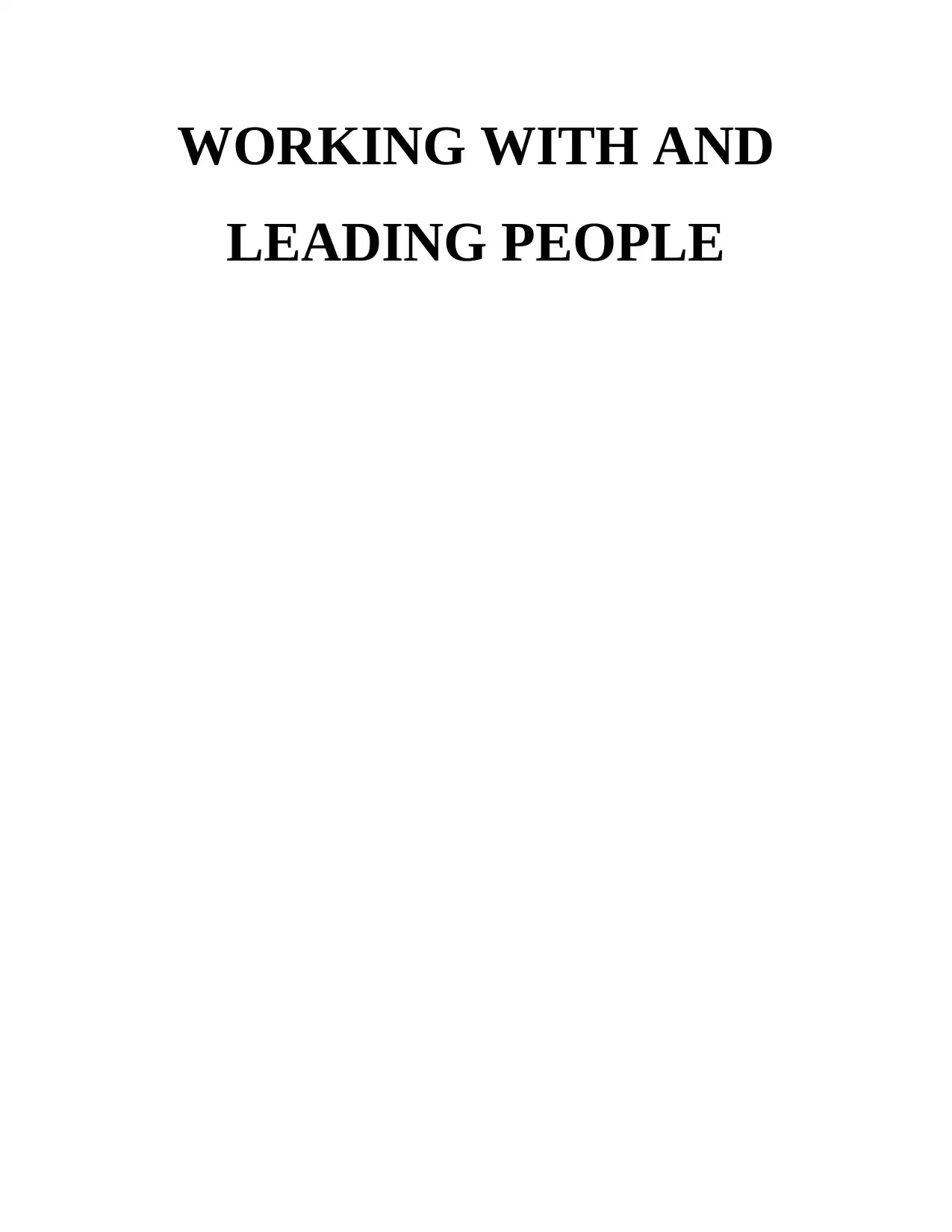
WORKING WITH AND
LEADING PEOPLE
LEADING PEOPLE
Paraphrase This Document
Need a fresh take? Get an instant paraphrase of this document with our AI Paraphraser
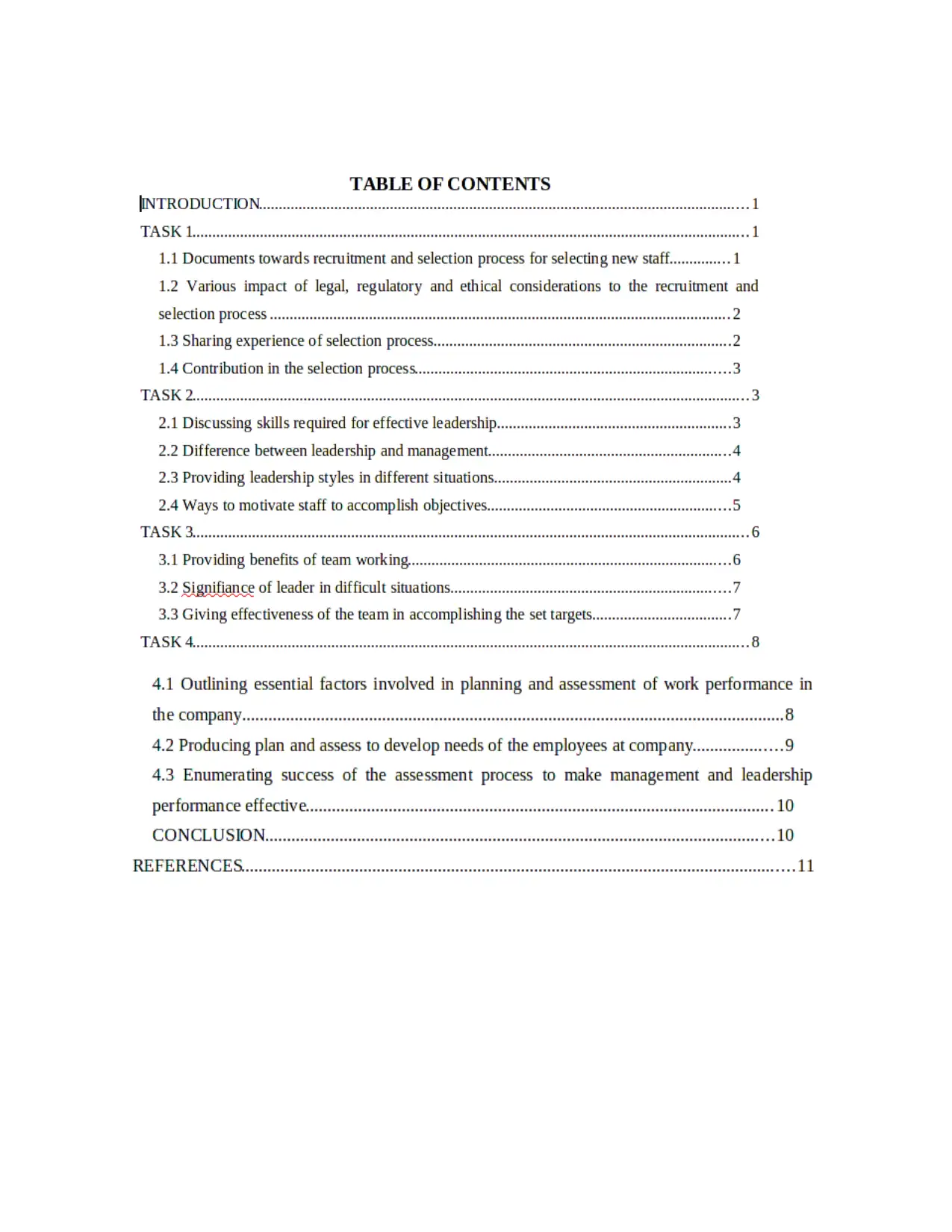
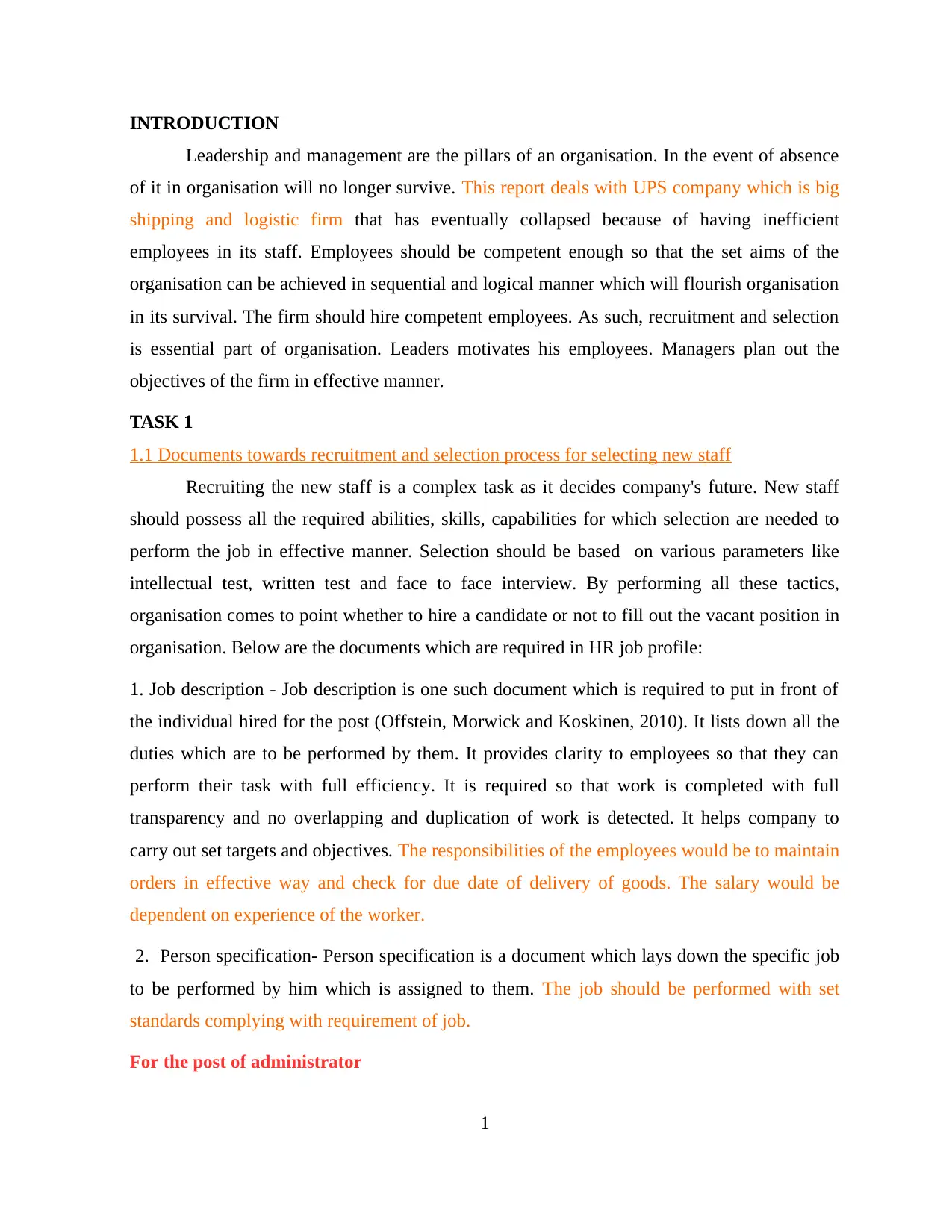
INTRODUCTION
Leadership and management are the pillars of an organisation. In the event of absence
of it in organisation will no longer survive. This report deals with UPS company which is big
shipping and logistic firm that has eventually collapsed because of having inefficient
employees in its staff. Employees should be competent enough so that the set aims of the
organisation can be achieved in sequential and logical manner which will flourish organisation
in its survival. The firm should hire competent employees. As such, recruitment and selection
is essential part of organisation. Leaders motivates his employees. Managers plan out the
objectives of the firm in effective manner.
TASK 1
1.1 Documents towards recruitment and selection process for selecting new staff
Recruiting the new staff is a complex task as it decides company's future. New staff
should possess all the required abilities, skills, capabilities for which selection are needed to
perform the job in effective manner. Selection should be based on various parameters like
intellectual test, written test and face to face interview. By performing all these tactics,
organisation comes to point whether to hire a candidate or not to fill out the vacant position in
organisation. Below are the documents which are required in HR job profile:
1. Job description - Job description is one such document which is required to put in front of
the individual hired for the post (Offstein, Morwick and Koskinen, 2010). It lists down all the
duties which are to be performed by them. It provides clarity to employees so that they can
perform their task with full efficiency. It is required so that work is completed with full
transparency and no overlapping and duplication of work is detected. It helps company to
carry out set targets and objectives. The responsibilities of the employees would be to maintain
orders in effective way and check for due date of delivery of goods. The salary would be
dependent on experience of the worker.
2. Person specification- Person specification is a document which lays down the specific job
to be performed by him which is assigned to them. The job should be performed with set
standards complying with requirement of job.
For the post of administrator
1
Leadership and management are the pillars of an organisation. In the event of absence
of it in organisation will no longer survive. This report deals with UPS company which is big
shipping and logistic firm that has eventually collapsed because of having inefficient
employees in its staff. Employees should be competent enough so that the set aims of the
organisation can be achieved in sequential and logical manner which will flourish organisation
in its survival. The firm should hire competent employees. As such, recruitment and selection
is essential part of organisation. Leaders motivates his employees. Managers plan out the
objectives of the firm in effective manner.
TASK 1
1.1 Documents towards recruitment and selection process for selecting new staff
Recruiting the new staff is a complex task as it decides company's future. New staff
should possess all the required abilities, skills, capabilities for which selection are needed to
perform the job in effective manner. Selection should be based on various parameters like
intellectual test, written test and face to face interview. By performing all these tactics,
organisation comes to point whether to hire a candidate or not to fill out the vacant position in
organisation. Below are the documents which are required in HR job profile:
1. Job description - Job description is one such document which is required to put in front of
the individual hired for the post (Offstein, Morwick and Koskinen, 2010). It lists down all the
duties which are to be performed by them. It provides clarity to employees so that they can
perform their task with full efficiency. It is required so that work is completed with full
transparency and no overlapping and duplication of work is detected. It helps company to
carry out set targets and objectives. The responsibilities of the employees would be to maintain
orders in effective way and check for due date of delivery of goods. The salary would be
dependent on experience of the worker.
2. Person specification- Person specification is a document which lays down the specific job
to be performed by him which is assigned to them. The job should be performed with set
standards complying with requirement of job.
For the post of administrator
1
⊘ This is a preview!⊘
Do you want full access?
Subscribe today to unlock all pages.

Trusted by 1+ million students worldwide
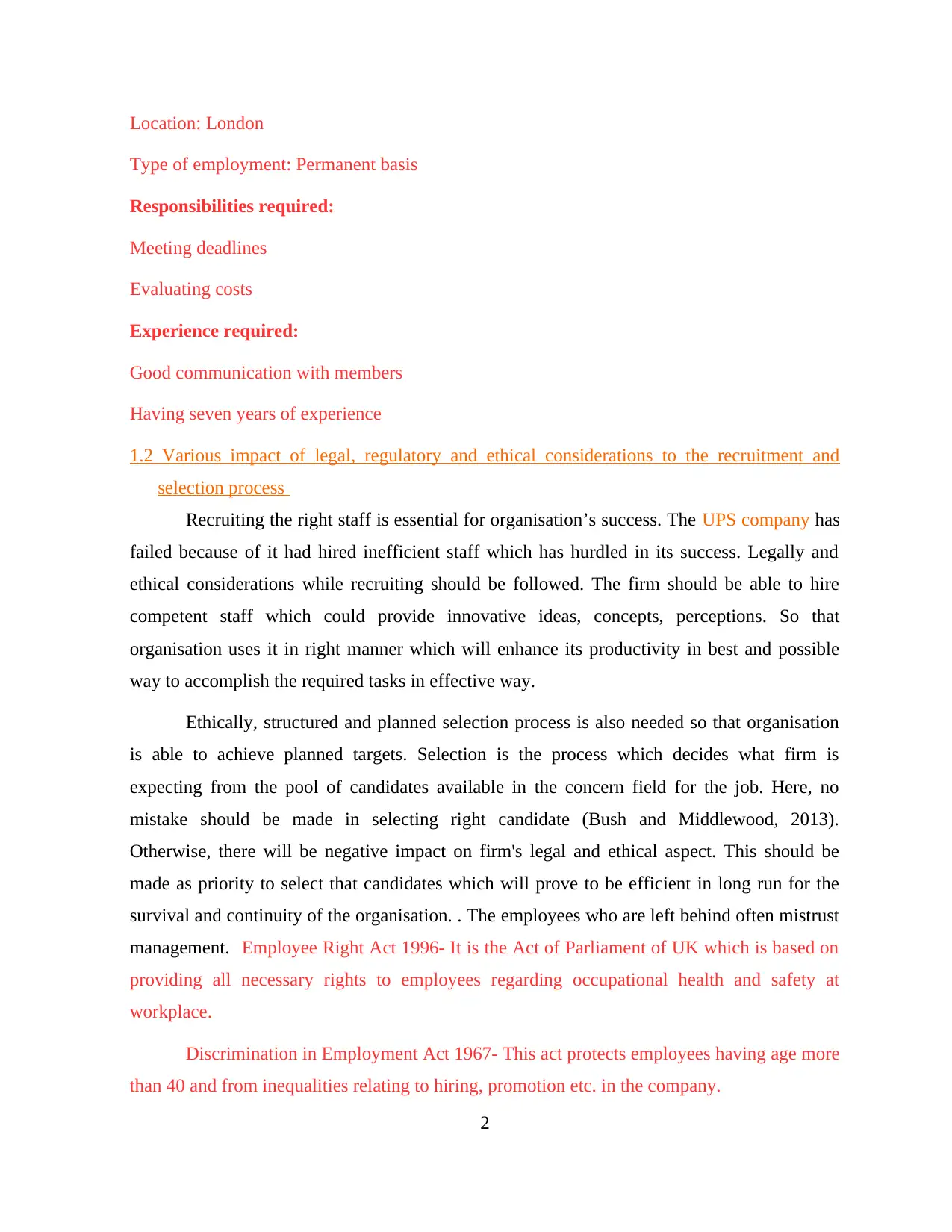
Location: London
Type of employment: Permanent basis
Responsibilities required:
Meeting deadlines
Evaluating costs
Experience required:
Good communication with members
Having seven years of experience
1.2 Various impact of legal, regulatory and ethical considerations to the recruitment and
selection process
Recruiting the right staff is essential for organisation’s success. The UPS company has
failed because of it had hired inefficient staff which has hurdled in its success. Legally and
ethical considerations while recruiting should be followed. The firm should be able to hire
competent staff which could provide innovative ideas, concepts, perceptions. So that
organisation uses it in right manner which will enhance its productivity in best and possible
way to accomplish the required tasks in effective way.
Ethically, structured and planned selection process is also needed so that organisation
is able to achieve planned targets. Selection is the process which decides what firm is
expecting from the pool of candidates available in the concern field for the job. Here, no
mistake should be made in selecting right candidate (Bush and Middlewood, 2013).
Otherwise, there will be negative impact on firm's legal and ethical aspect. This should be
made as priority to select that candidates which will prove to be efficient in long run for the
survival and continuity of the organisation. . The employees who are left behind often mistrust
management. Employee Right Act 1996- It is the Act of Parliament of UK which is based on
providing all necessary rights to employees regarding occupational health and safety at
workplace.
Discrimination in Employment Act 1967- This act protects employees having age more
than 40 and from inequalities relating to hiring, promotion etc. in the company.
2
Type of employment: Permanent basis
Responsibilities required:
Meeting deadlines
Evaluating costs
Experience required:
Good communication with members
Having seven years of experience
1.2 Various impact of legal, regulatory and ethical considerations to the recruitment and
selection process
Recruiting the right staff is essential for organisation’s success. The UPS company has
failed because of it had hired inefficient staff which has hurdled in its success. Legally and
ethical considerations while recruiting should be followed. The firm should be able to hire
competent staff which could provide innovative ideas, concepts, perceptions. So that
organisation uses it in right manner which will enhance its productivity in best and possible
way to accomplish the required tasks in effective way.
Ethically, structured and planned selection process is also needed so that organisation
is able to achieve planned targets. Selection is the process which decides what firm is
expecting from the pool of candidates available in the concern field for the job. Here, no
mistake should be made in selecting right candidate (Bush and Middlewood, 2013).
Otherwise, there will be negative impact on firm's legal and ethical aspect. This should be
made as priority to select that candidates which will prove to be efficient in long run for the
survival and continuity of the organisation. . The employees who are left behind often mistrust
management. Employee Right Act 1996- It is the Act of Parliament of UK which is based on
providing all necessary rights to employees regarding occupational health and safety at
workplace.
Discrimination in Employment Act 1967- This act protects employees having age more
than 40 and from inequalities relating to hiring, promotion etc. in the company.
2
Paraphrase This Document
Need a fresh take? Get an instant paraphrase of this document with our AI Paraphraser
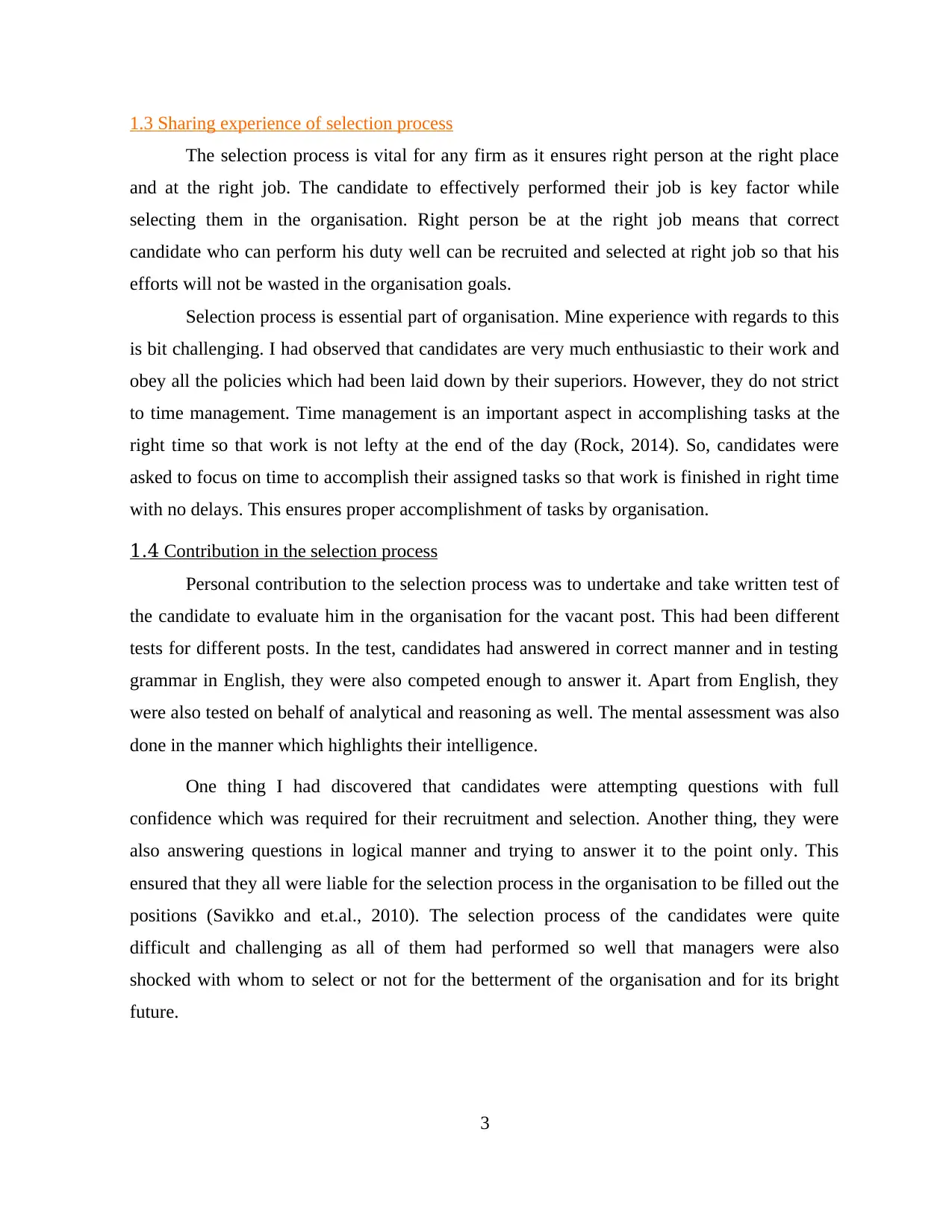
1.3 Sharing experience of selection process
The selection process is vital for any firm as it ensures right person at the right place
and at the right job. The candidate to effectively performed their job is key factor while
selecting them in the organisation. Right person be at the right job means that correct
candidate who can perform his duty well can be recruited and selected at right job so that his
efforts will not be wasted in the organisation goals.
Selection process is essential part of organisation. Mine experience with regards to this
is bit challenging. I had observed that candidates are very much enthusiastic to their work and
obey all the policies which had been laid down by their superiors. However, they do not strict
to time management. Time management is an important aspect in accomplishing tasks at the
right time so that work is not lefty at the end of the day (Rock, 2014). So, candidates were
asked to focus on time to accomplish their assigned tasks so that work is finished in right time
with no delays. This ensures proper accomplishment of tasks by organisation.
1.4 Contribution in the selection process
Personal contribution to the selection process was to undertake and take written test of
the candidate to evaluate him in the organisation for the vacant post. This had been different
tests for different posts. In the test, candidates had answered in correct manner and in testing
grammar in English, they were also competed enough to answer it. Apart from English, they
were also tested on behalf of analytical and reasoning as well. The mental assessment was also
done in the manner which highlights their intelligence.
One thing I had discovered that candidates were attempting questions with full
confidence which was required for their recruitment and selection. Another thing, they were
also answering questions in logical manner and trying to answer it to the point only. This
ensured that they all were liable for the selection process in the organisation to be filled out the
positions (Savikko and et.al., 2010). The selection process of the candidates were quite
difficult and challenging as all of them had performed so well that managers were also
shocked with whom to select or not for the betterment of the organisation and for its bright
future.
3
The selection process is vital for any firm as it ensures right person at the right place
and at the right job. The candidate to effectively performed their job is key factor while
selecting them in the organisation. Right person be at the right job means that correct
candidate who can perform his duty well can be recruited and selected at right job so that his
efforts will not be wasted in the organisation goals.
Selection process is essential part of organisation. Mine experience with regards to this
is bit challenging. I had observed that candidates are very much enthusiastic to their work and
obey all the policies which had been laid down by their superiors. However, they do not strict
to time management. Time management is an important aspect in accomplishing tasks at the
right time so that work is not lefty at the end of the day (Rock, 2014). So, candidates were
asked to focus on time to accomplish their assigned tasks so that work is finished in right time
with no delays. This ensures proper accomplishment of tasks by organisation.
1.4 Contribution in the selection process
Personal contribution to the selection process was to undertake and take written test of
the candidate to evaluate him in the organisation for the vacant post. This had been different
tests for different posts. In the test, candidates had answered in correct manner and in testing
grammar in English, they were also competed enough to answer it. Apart from English, they
were also tested on behalf of analytical and reasoning as well. The mental assessment was also
done in the manner which highlights their intelligence.
One thing I had discovered that candidates were attempting questions with full
confidence which was required for their recruitment and selection. Another thing, they were
also answering questions in logical manner and trying to answer it to the point only. This
ensured that they all were liable for the selection process in the organisation to be filled out the
positions (Savikko and et.al., 2010). The selection process of the candidates were quite
difficult and challenging as all of them had performed so well that managers were also
shocked with whom to select or not for the betterment of the organisation and for its bright
future.
3
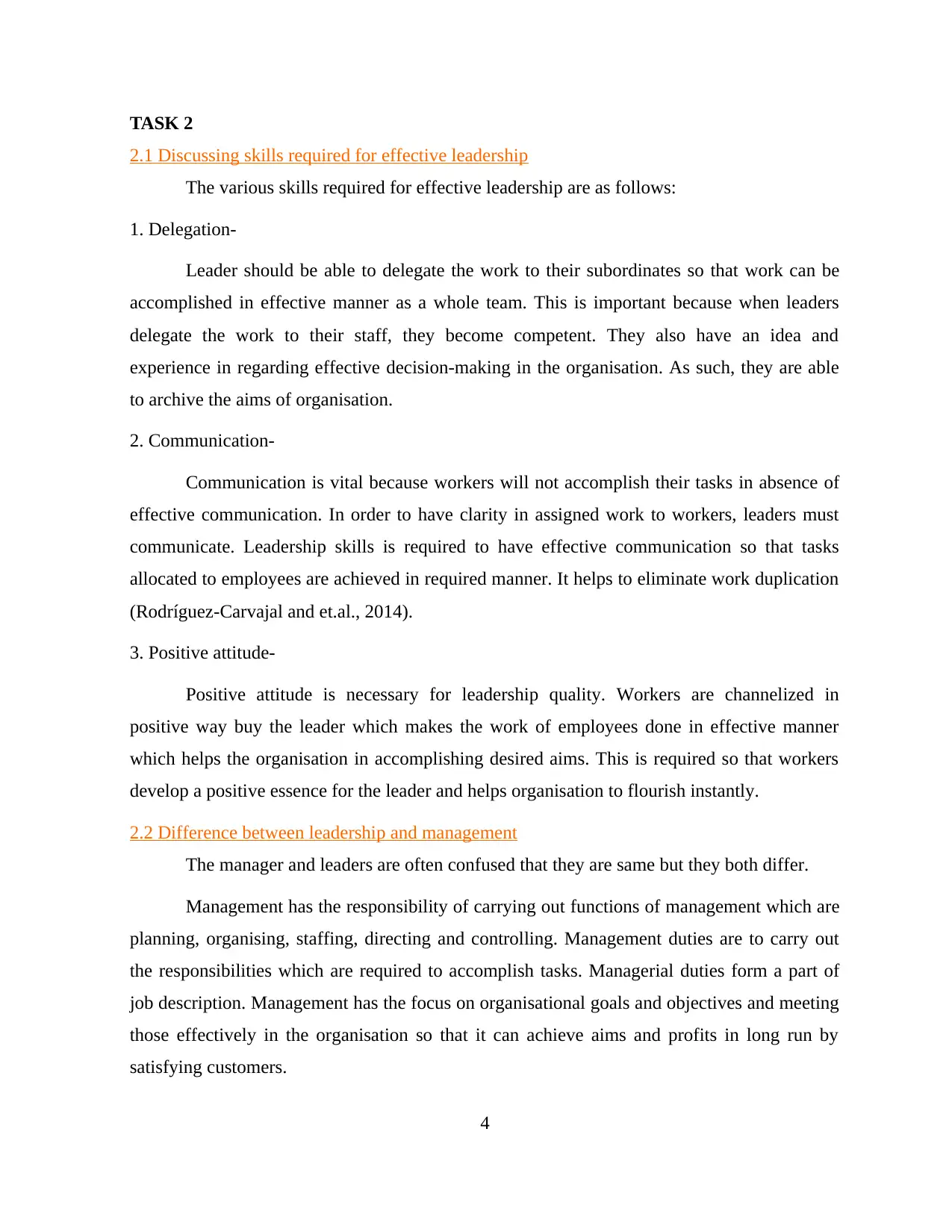
TASK 2
2.1 Discussing skills required for effective leadership
The various skills required for effective leadership are as follows:
1. Delegation-
Leader should be able to delegate the work to their subordinates so that work can be
accomplished in effective manner as a whole team. This is important because when leaders
delegate the work to their staff, they become competent. They also have an idea and
experience in regarding effective decision-making in the organisation. As such, they are able
to archive the aims of organisation.
2. Communication-
Communication is vital because workers will not accomplish their tasks in absence of
effective communication. In order to have clarity in assigned work to workers, leaders must
communicate. Leadership skills is required to have effective communication so that tasks
allocated to employees are achieved in required manner. It helps to eliminate work duplication
(Rodríguez-Carvajal and et.al., 2014).
3. Positive attitude-
Positive attitude is necessary for leadership quality. Workers are channelized in
positive way buy the leader which makes the work of employees done in effective manner
which helps the organisation in accomplishing desired aims. This is required so that workers
develop a positive essence for the leader and helps organisation to flourish instantly.
2.2 Difference between leadership and management
The manager and leaders are often confused that they are same but they both differ.
Management has the responsibility of carrying out functions of management which are
planning, organising, staffing, directing and controlling. Management duties are to carry out
the responsibilities which are required to accomplish tasks. Managerial duties form a part of
job description. Management has the focus on organisational goals and objectives and meeting
those effectively in the organisation so that it can achieve aims and profits in long run by
satisfying customers.
4
2.1 Discussing skills required for effective leadership
The various skills required for effective leadership are as follows:
1. Delegation-
Leader should be able to delegate the work to their subordinates so that work can be
accomplished in effective manner as a whole team. This is important because when leaders
delegate the work to their staff, they become competent. They also have an idea and
experience in regarding effective decision-making in the organisation. As such, they are able
to archive the aims of organisation.
2. Communication-
Communication is vital because workers will not accomplish their tasks in absence of
effective communication. In order to have clarity in assigned work to workers, leaders must
communicate. Leadership skills is required to have effective communication so that tasks
allocated to employees are achieved in required manner. It helps to eliminate work duplication
(Rodríguez-Carvajal and et.al., 2014).
3. Positive attitude-
Positive attitude is necessary for leadership quality. Workers are channelized in
positive way buy the leader which makes the work of employees done in effective manner
which helps the organisation in accomplishing desired aims. This is required so that workers
develop a positive essence for the leader and helps organisation to flourish instantly.
2.2 Difference between leadership and management
The manager and leaders are often confused that they are same but they both differ.
Management has the responsibility of carrying out functions of management which are
planning, organising, staffing, directing and controlling. Management duties are to carry out
the responsibilities which are required to accomplish tasks. Managerial duties form a part of
job description. Management has the focus on organisational goals and objectives and meeting
those effectively in the organisation so that it can achieve aims and profits in long run by
satisfying customers.
4
⊘ This is a preview!⊘
Do you want full access?
Subscribe today to unlock all pages.

Trusted by 1+ million students worldwide
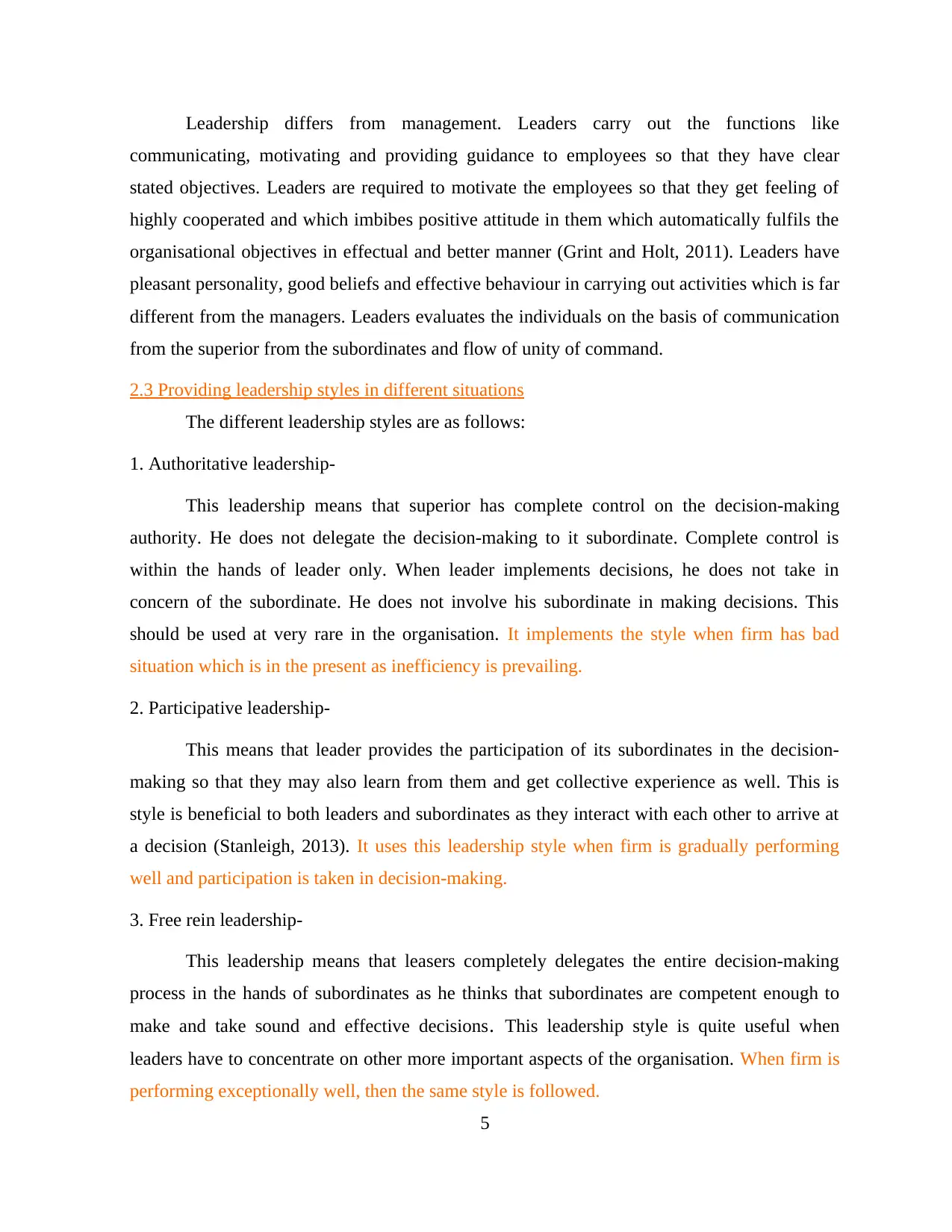
Leadership differs from management. Leaders carry out the functions like
communicating, motivating and providing guidance to employees so that they have clear
stated objectives. Leaders are required to motivate the employees so that they get feeling of
highly cooperated and which imbibes positive attitude in them which automatically fulfils the
organisational objectives in effectual and better manner (Grint and Holt, 2011). Leaders have
pleasant personality, good beliefs and effective behaviour in carrying out activities which is far
different from the managers. Leaders evaluates the individuals on the basis of communication
from the superior from the subordinates and flow of unity of command.
2.3 Providing leadership styles in different situations
The different leadership styles are as follows:
1. Authoritative leadership-
This leadership means that superior has complete control on the decision-making
authority. He does not delegate the decision-making to it subordinate. Complete control is
within the hands of leader only. When leader implements decisions, he does not take in
concern of the subordinate. He does not involve his subordinate in making decisions. This
should be used at very rare in the organisation. It implements the style when firm has bad
situation which is in the present as inefficiency is prevailing.
2. Participative leadership-
This means that leader provides the participation of its subordinates in the decision-
making so that they may also learn from them and get collective experience as well. This is
style is beneficial to both leaders and subordinates as they interact with each other to arrive at
a decision (Stanleigh, 2013). It uses this leadership style when firm is gradually performing
well and participation is taken in decision-making.
3. Free rein leadership-
This leadership means that leasers completely delegates the entire decision-making
process in the hands of subordinates as he thinks that subordinates are competent enough to
make and take sound and effective decisions. This leadership style is quite useful when
leaders have to concentrate on other more important aspects of the organisation. When firm is
performing exceptionally well, then the same style is followed.
5
communicating, motivating and providing guidance to employees so that they have clear
stated objectives. Leaders are required to motivate the employees so that they get feeling of
highly cooperated and which imbibes positive attitude in them which automatically fulfils the
organisational objectives in effectual and better manner (Grint and Holt, 2011). Leaders have
pleasant personality, good beliefs and effective behaviour in carrying out activities which is far
different from the managers. Leaders evaluates the individuals on the basis of communication
from the superior from the subordinates and flow of unity of command.
2.3 Providing leadership styles in different situations
The different leadership styles are as follows:
1. Authoritative leadership-
This leadership means that superior has complete control on the decision-making
authority. He does not delegate the decision-making to it subordinate. Complete control is
within the hands of leader only. When leader implements decisions, he does not take in
concern of the subordinate. He does not involve his subordinate in making decisions. This
should be used at very rare in the organisation. It implements the style when firm has bad
situation which is in the present as inefficiency is prevailing.
2. Participative leadership-
This means that leader provides the participation of its subordinates in the decision-
making so that they may also learn from them and get collective experience as well. This is
style is beneficial to both leaders and subordinates as they interact with each other to arrive at
a decision (Stanleigh, 2013). It uses this leadership style when firm is gradually performing
well and participation is taken in decision-making.
3. Free rein leadership-
This leadership means that leasers completely delegates the entire decision-making
process in the hands of subordinates as he thinks that subordinates are competent enough to
make and take sound and effective decisions. This leadership style is quite useful when
leaders have to concentrate on other more important aspects of the organisation. When firm is
performing exceptionally well, then the same style is followed.
5
Paraphrase This Document
Need a fresh take? Get an instant paraphrase of this document with our AI Paraphraser
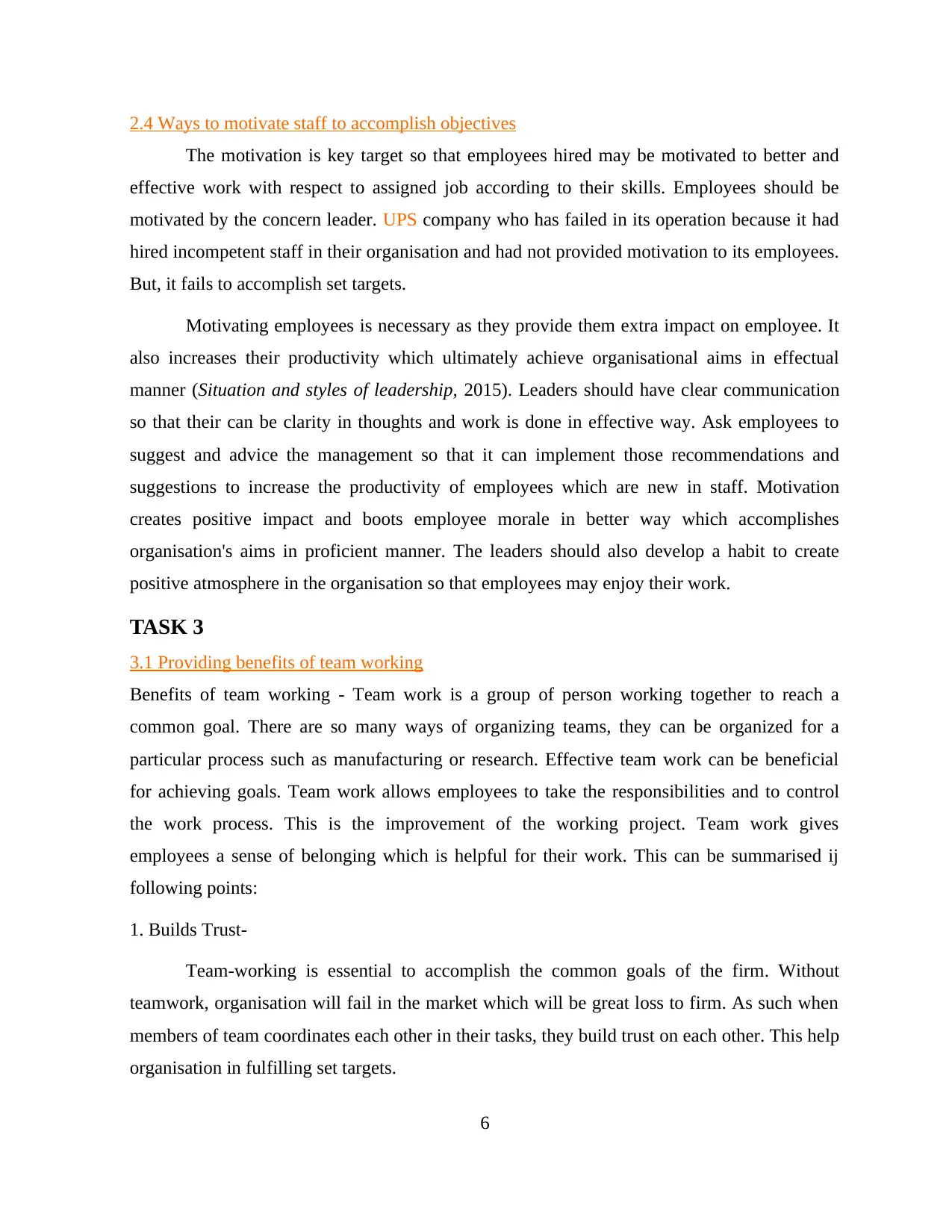
2.4 Ways to motivate staff to accomplish objectives
The motivation is key target so that employees hired may be motivated to better and
effective work with respect to assigned job according to their skills. Employees should be
motivated by the concern leader. UPS company who has failed in its operation because it had
hired incompetent staff in their organisation and had not provided motivation to its employees.
But, it fails to accomplish set targets.
Motivating employees is necessary as they provide them extra impact on employee. It
also increases their productivity which ultimately achieve organisational aims in effectual
manner (Situation and styles of leadership, 2015). Leaders should have clear communication
so that their can be clarity in thoughts and work is done in effective way. Ask employees to
suggest and advice the management so that it can implement those recommendations and
suggestions to increase the productivity of employees which are new in staff. Motivation
creates positive impact and boots employee morale in better way which accomplishes
organisation's aims in proficient manner. The leaders should also develop a habit to create
positive atmosphere in the organisation so that employees may enjoy their work.
TASK 3
3.1 Providing benefits of team working
Benefits of team working - Team work is a group of person working together to reach a
common goal. There are so many ways of organizing teams, they can be organized for a
particular process such as manufacturing or research. Effective team work can be beneficial
for achieving goals. Team work allows employees to take the responsibilities and to control
the work process. This is the improvement of the working project. Team work gives
employees a sense of belonging which is helpful for their work. This can be summarised ij
following points:
1. Builds Trust-
Team-working is essential to accomplish the common goals of the firm. Without
teamwork, organisation will fail in the market which will be great loss to firm. As such when
members of team coordinates each other in their tasks, they build trust on each other. This help
organisation in fulfilling set targets.
6
The motivation is key target so that employees hired may be motivated to better and
effective work with respect to assigned job according to their skills. Employees should be
motivated by the concern leader. UPS company who has failed in its operation because it had
hired incompetent staff in their organisation and had not provided motivation to its employees.
But, it fails to accomplish set targets.
Motivating employees is necessary as they provide them extra impact on employee. It
also increases their productivity which ultimately achieve organisational aims in effectual
manner (Situation and styles of leadership, 2015). Leaders should have clear communication
so that their can be clarity in thoughts and work is done in effective way. Ask employees to
suggest and advice the management so that it can implement those recommendations and
suggestions to increase the productivity of employees which are new in staff. Motivation
creates positive impact and boots employee morale in better way which accomplishes
organisation's aims in proficient manner. The leaders should also develop a habit to create
positive atmosphere in the organisation so that employees may enjoy their work.
TASK 3
3.1 Providing benefits of team working
Benefits of team working - Team work is a group of person working together to reach a
common goal. There are so many ways of organizing teams, they can be organized for a
particular process such as manufacturing or research. Effective team work can be beneficial
for achieving goals. Team work allows employees to take the responsibilities and to control
the work process. This is the improvement of the working project. Team work gives
employees a sense of belonging which is helpful for their work. This can be summarised ij
following points:
1. Builds Trust-
Team-working is essential to accomplish the common goals of the firm. Without
teamwork, organisation will fail in the market which will be great loss to firm. As such when
members of team coordinates each other in their tasks, they build trust on each other. This help
organisation in fulfilling set targets.
6
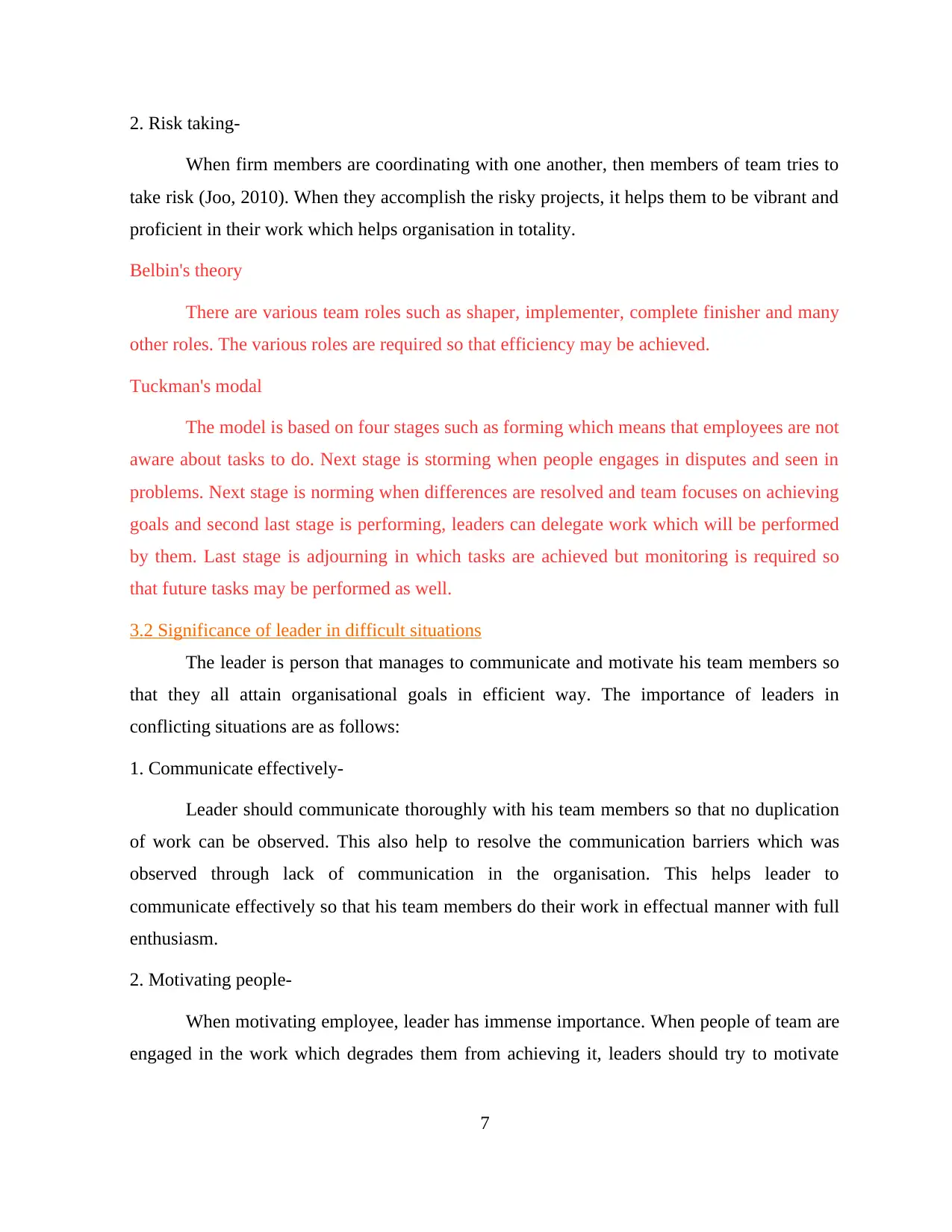
2. Risk taking-
When firm members are coordinating with one another, then members of team tries to
take risk (Joo, 2010). When they accomplish the risky projects, it helps them to be vibrant and
proficient in their work which helps organisation in totality.
Belbin's theory
There are various team roles such as shaper, implementer, complete finisher and many
other roles. The various roles are required so that efficiency may be achieved.
Tuckman's modal
The model is based on four stages such as forming which means that employees are not
aware about tasks to do. Next stage is storming when people engages in disputes and seen in
problems. Next stage is norming when differences are resolved and team focuses on achieving
goals and second last stage is performing, leaders can delegate work which will be performed
by them. Last stage is adjourning in which tasks are achieved but monitoring is required so
that future tasks may be performed as well.
3.2 Significance of leader in difficult situations
The leader is person that manages to communicate and motivate his team members so
that they all attain organisational goals in efficient way. The importance of leaders in
conflicting situations are as follows:
1. Communicate effectively-
Leader should communicate thoroughly with his team members so that no duplication
of work can be observed. This also help to resolve the communication barriers which was
observed through lack of communication in the organisation. This helps leader to
communicate effectively so that his team members do their work in effectual manner with full
enthusiasm.
2. Motivating people-
When motivating employee, leader has immense importance. When people of team are
engaged in the work which degrades them from achieving it, leaders should try to motivate
7
When firm members are coordinating with one another, then members of team tries to
take risk (Joo, 2010). When they accomplish the risky projects, it helps them to be vibrant and
proficient in their work which helps organisation in totality.
Belbin's theory
There are various team roles such as shaper, implementer, complete finisher and many
other roles. The various roles are required so that efficiency may be achieved.
Tuckman's modal
The model is based on four stages such as forming which means that employees are not
aware about tasks to do. Next stage is storming when people engages in disputes and seen in
problems. Next stage is norming when differences are resolved and team focuses on achieving
goals and second last stage is performing, leaders can delegate work which will be performed
by them. Last stage is adjourning in which tasks are achieved but monitoring is required so
that future tasks may be performed as well.
3.2 Significance of leader in difficult situations
The leader is person that manages to communicate and motivate his team members so
that they all attain organisational goals in efficient way. The importance of leaders in
conflicting situations are as follows:
1. Communicate effectively-
Leader should communicate thoroughly with his team members so that no duplication
of work can be observed. This also help to resolve the communication barriers which was
observed through lack of communication in the organisation. This helps leader to
communicate effectively so that his team members do their work in effectual manner with full
enthusiasm.
2. Motivating people-
When motivating employee, leader has immense importance. When people of team are
engaged in the work which degrades them from achieving it, leaders should try to motivate
7
⊘ This is a preview!⊘
Do you want full access?
Subscribe today to unlock all pages.

Trusted by 1+ million students worldwide
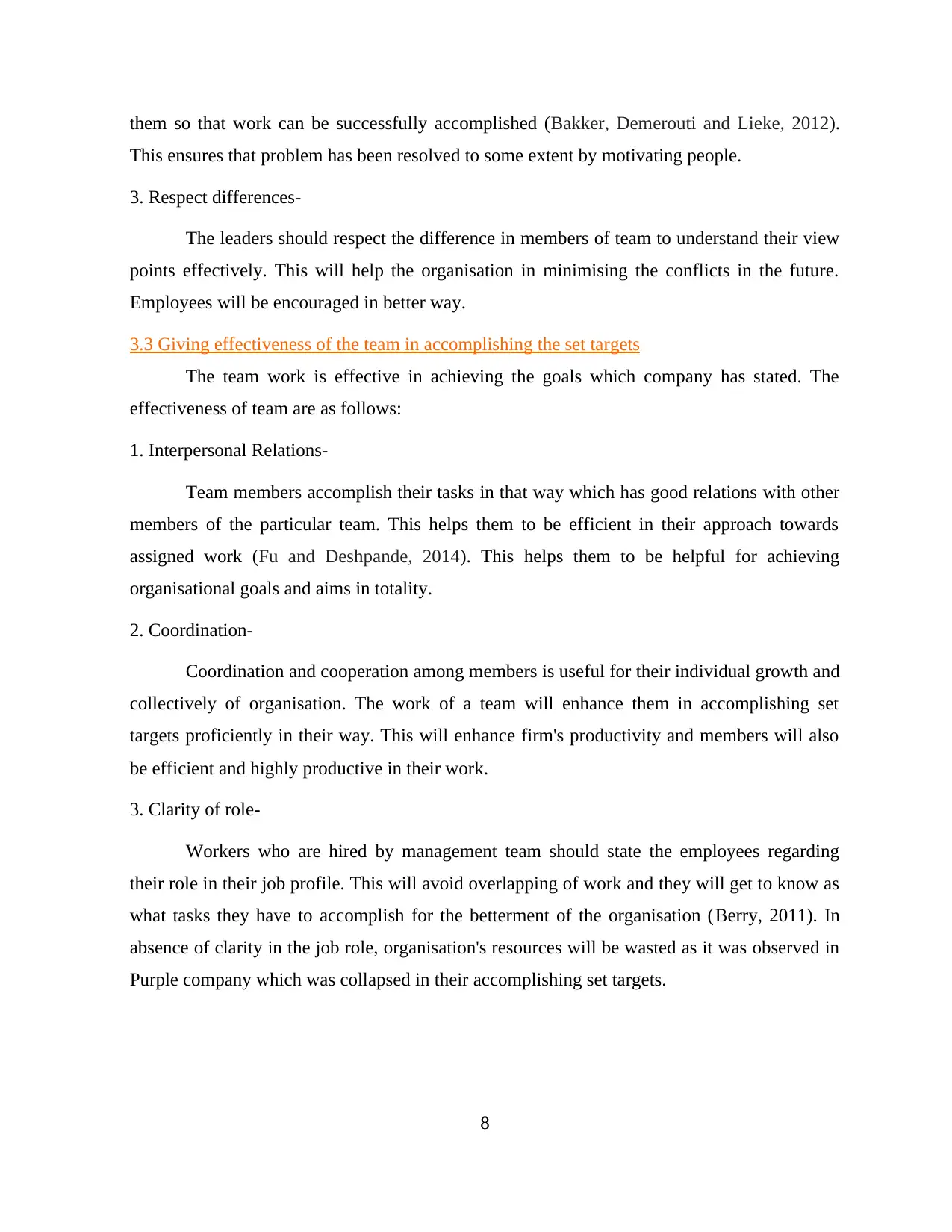
them so that work can be successfully accomplished (Bakker, Demerouti and Lieke, 2012).
This ensures that problem has been resolved to some extent by motivating people.
3. Respect differences-
The leaders should respect the difference in members of team to understand their view
points effectively. This will help the organisation in minimising the conflicts in the future.
Employees will be encouraged in better way.
3.3 Giving effectiveness of the team in accomplishing the set targets
The team work is effective in achieving the goals which company has stated. The
effectiveness of team are as follows:
1. Interpersonal Relations-
Team members accomplish their tasks in that way which has good relations with other
members of the particular team. This helps them to be efficient in their approach towards
assigned work (Fu and Deshpande, 2014). This helps them to be helpful for achieving
organisational goals and aims in totality.
2. Coordination-
Coordination and cooperation among members is useful for their individual growth and
collectively of organisation. The work of a team will enhance them in accomplishing set
targets proficiently in their way. This will enhance firm's productivity and members will also
be efficient and highly productive in their work.
3. Clarity of role-
Workers who are hired by management team should state the employees regarding
their role in their job profile. This will avoid overlapping of work and they will get to know as
what tasks they have to accomplish for the betterment of the organisation (Berry, 2011). In
absence of clarity in the job role, organisation's resources will be wasted as it was observed in
Purple company which was collapsed in their accomplishing set targets.
8
This ensures that problem has been resolved to some extent by motivating people.
3. Respect differences-
The leaders should respect the difference in members of team to understand their view
points effectively. This will help the organisation in minimising the conflicts in the future.
Employees will be encouraged in better way.
3.3 Giving effectiveness of the team in accomplishing the set targets
The team work is effective in achieving the goals which company has stated. The
effectiveness of team are as follows:
1. Interpersonal Relations-
Team members accomplish their tasks in that way which has good relations with other
members of the particular team. This helps them to be efficient in their approach towards
assigned work (Fu and Deshpande, 2014). This helps them to be helpful for achieving
organisational goals and aims in totality.
2. Coordination-
Coordination and cooperation among members is useful for their individual growth and
collectively of organisation. The work of a team will enhance them in accomplishing set
targets proficiently in their way. This will enhance firm's productivity and members will also
be efficient and highly productive in their work.
3. Clarity of role-
Workers who are hired by management team should state the employees regarding
their role in their job profile. This will avoid overlapping of work and they will get to know as
what tasks they have to accomplish for the betterment of the organisation (Berry, 2011). In
absence of clarity in the job role, organisation's resources will be wasted as it was observed in
Purple company which was collapsed in their accomplishing set targets.
8
Paraphrase This Document
Need a fresh take? Get an instant paraphrase of this document with our AI Paraphraser
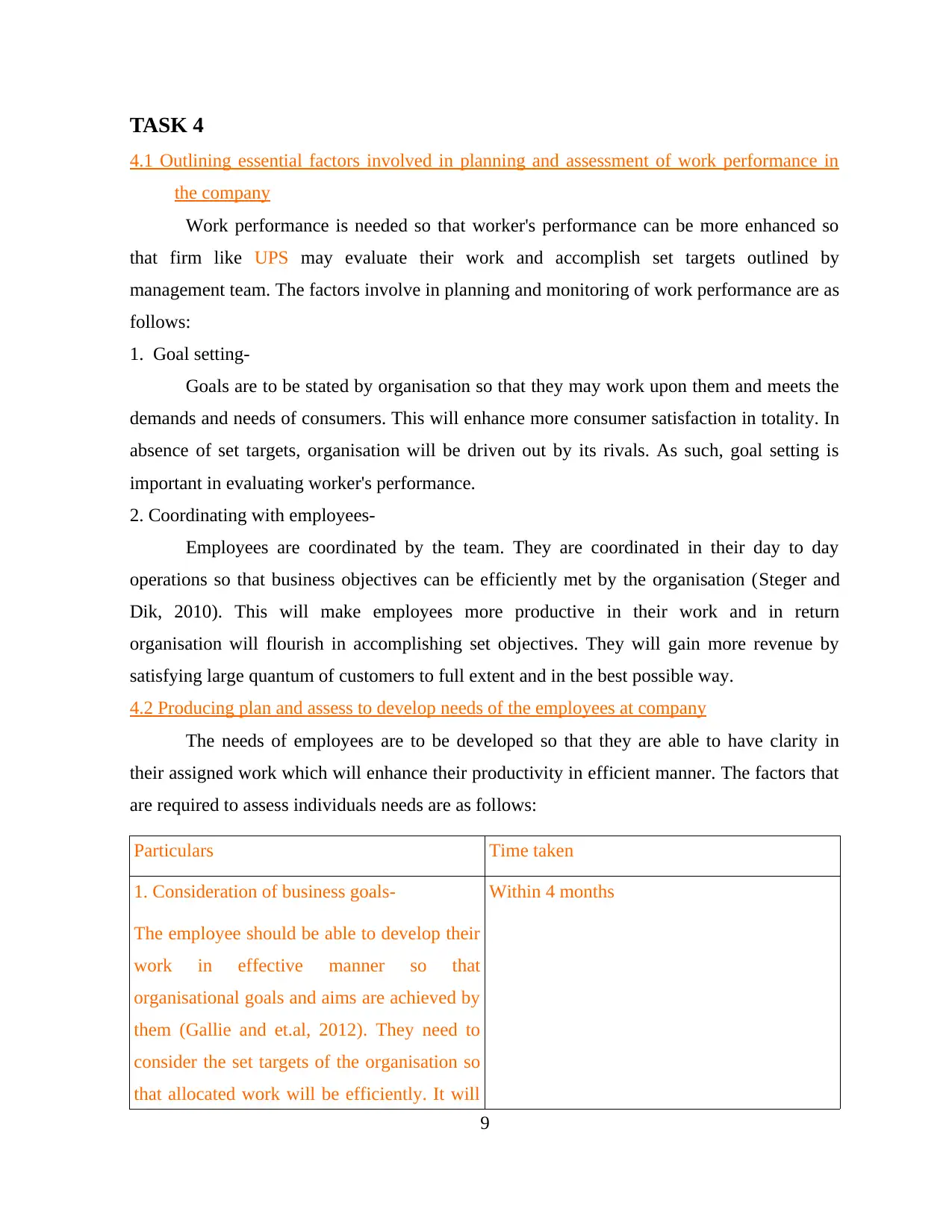
TASK 4
4.1 Outlining essential factors involved in planning and assessment of work performance in
the company
Work performance is needed so that worker's performance can be more enhanced so
that firm like UPS may evaluate their work and accomplish set targets outlined by
management team. The factors involve in planning and monitoring of work performance are as
follows:
1. Goal setting-
Goals are to be stated by organisation so that they may work upon them and meets the
demands and needs of consumers. This will enhance more consumer satisfaction in totality. In
absence of set targets, organisation will be driven out by its rivals. As such, goal setting is
important in evaluating worker's performance.
2. Coordinating with employees-
Employees are coordinated by the team. They are coordinated in their day to day
operations so that business objectives can be efficiently met by the organisation (Steger and
Dik, 2010). This will make employees more productive in their work and in return
organisation will flourish in accomplishing set objectives. They will gain more revenue by
satisfying large quantum of customers to full extent and in the best possible way.
4.2 Producing plan and assess to develop needs of the employees at company
The needs of employees are to be developed so that they are able to have clarity in
their assigned work which will enhance their productivity in efficient manner. The factors that
are required to assess individuals needs are as follows:
Particulars Time taken
1. Consideration of business goals-
The employee should be able to develop their
work in effective manner so that
organisational goals and aims are achieved by
them (Gallie and et.al, 2012). They need to
consider the set targets of the organisation so
that allocated work will be efficiently. It will
Within 4 months
9
4.1 Outlining essential factors involved in planning and assessment of work performance in
the company
Work performance is needed so that worker's performance can be more enhanced so
that firm like UPS may evaluate their work and accomplish set targets outlined by
management team. The factors involve in planning and monitoring of work performance are as
follows:
1. Goal setting-
Goals are to be stated by organisation so that they may work upon them and meets the
demands and needs of consumers. This will enhance more consumer satisfaction in totality. In
absence of set targets, organisation will be driven out by its rivals. As such, goal setting is
important in evaluating worker's performance.
2. Coordinating with employees-
Employees are coordinated by the team. They are coordinated in their day to day
operations so that business objectives can be efficiently met by the organisation (Steger and
Dik, 2010). This will make employees more productive in their work and in return
organisation will flourish in accomplishing set objectives. They will gain more revenue by
satisfying large quantum of customers to full extent and in the best possible way.
4.2 Producing plan and assess to develop needs of the employees at company
The needs of employees are to be developed so that they are able to have clarity in
their assigned work which will enhance their productivity in efficient manner. The factors that
are required to assess individuals needs are as follows:
Particulars Time taken
1. Consideration of business goals-
The employee should be able to develop their
work in effective manner so that
organisational goals and aims are achieved by
them (Gallie and et.al, 2012). They need to
consider the set targets of the organisation so
that allocated work will be efficiently. It will
Within 4 months
9
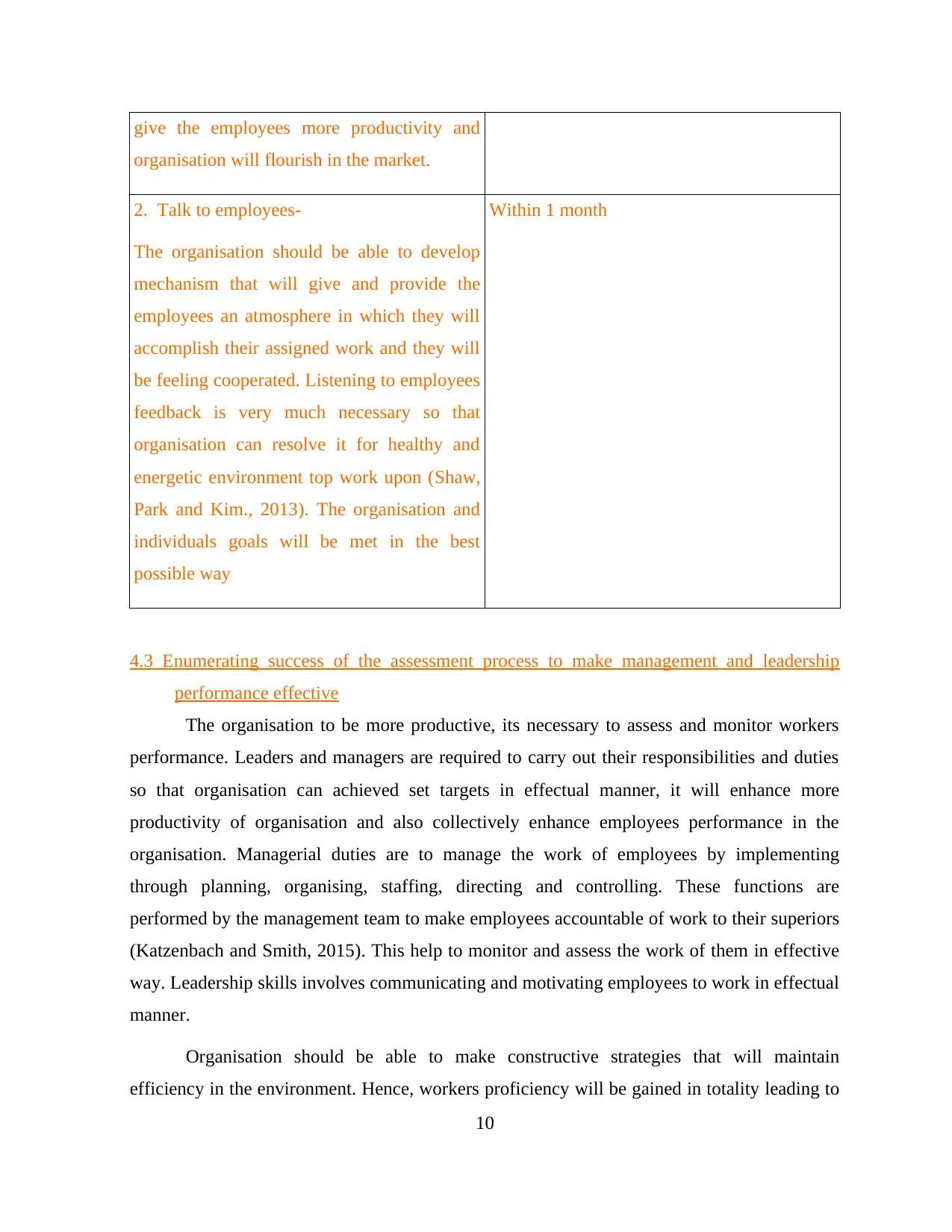
give the employees more productivity and
organisation will flourish in the market.
2. Talk to employees-
The organisation should be able to develop
mechanism that will give and provide the
employees an atmosphere in which they will
accomplish their assigned work and they will
be feeling cooperated. Listening to employees
feedback is very much necessary so that
organisation can resolve it for healthy and
energetic environment top work upon (Shaw,
Park and Kim., 2013). The organisation and
individuals goals will be met in the best
possible way
Within 1 month
4.3 Enumerating success of the assessment process to make management and leadership
performance effective
The organisation to be more productive, its necessary to assess and monitor workers
performance. Leaders and managers are required to carry out their responsibilities and duties
so that organisation can achieved set targets in effectual manner, it will enhance more
productivity of organisation and also collectively enhance employees performance in the
organisation. Managerial duties are to manage the work of employees by implementing
through planning, organising, staffing, directing and controlling. These functions are
performed by the management team to make employees accountable of work to their superiors
(Katzenbach and Smith, 2015). This help to monitor and assess the work of them in effective
way. Leadership skills involves communicating and motivating employees to work in effectual
manner.
Organisation should be able to make constructive strategies that will maintain
efficiency in the environment. Hence, workers proficiency will be gained in totality leading to
10
organisation will flourish in the market.
2. Talk to employees-
The organisation should be able to develop
mechanism that will give and provide the
employees an atmosphere in which they will
accomplish their assigned work and they will
be feeling cooperated. Listening to employees
feedback is very much necessary so that
organisation can resolve it for healthy and
energetic environment top work upon (Shaw,
Park and Kim., 2013). The organisation and
individuals goals will be met in the best
possible way
Within 1 month
4.3 Enumerating success of the assessment process to make management and leadership
performance effective
The organisation to be more productive, its necessary to assess and monitor workers
performance. Leaders and managers are required to carry out their responsibilities and duties
so that organisation can achieved set targets in effectual manner, it will enhance more
productivity of organisation and also collectively enhance employees performance in the
organisation. Managerial duties are to manage the work of employees by implementing
through planning, organising, staffing, directing and controlling. These functions are
performed by the management team to make employees accountable of work to their superiors
(Katzenbach and Smith, 2015). This help to monitor and assess the work of them in effective
way. Leadership skills involves communicating and motivating employees to work in effectual
manner.
Organisation should be able to make constructive strategies that will maintain
efficiency in the environment. Hence, workers proficiency will be gained in totality leading to
10
⊘ This is a preview!⊘
Do you want full access?
Subscribe today to unlock all pages.

Trusted by 1+ million students worldwide
1 out of 15
Related Documents
Your All-in-One AI-Powered Toolkit for Academic Success.
+13062052269
info@desklib.com
Available 24*7 on WhatsApp / Email
![[object Object]](/_next/static/media/star-bottom.7253800d.svg)
Unlock your academic potential
Copyright © 2020–2026 A2Z Services. All Rights Reserved. Developed and managed by ZUCOL.





